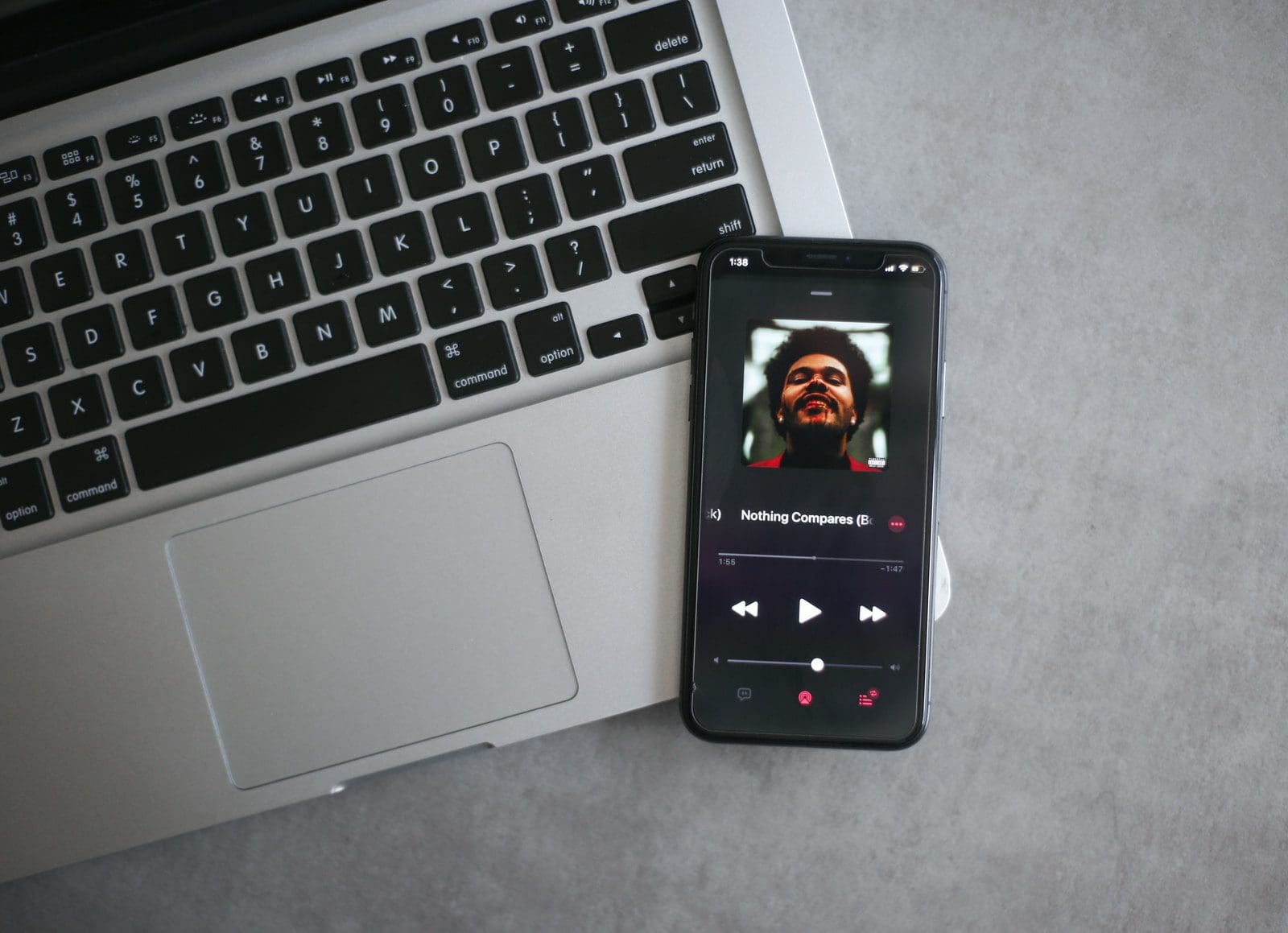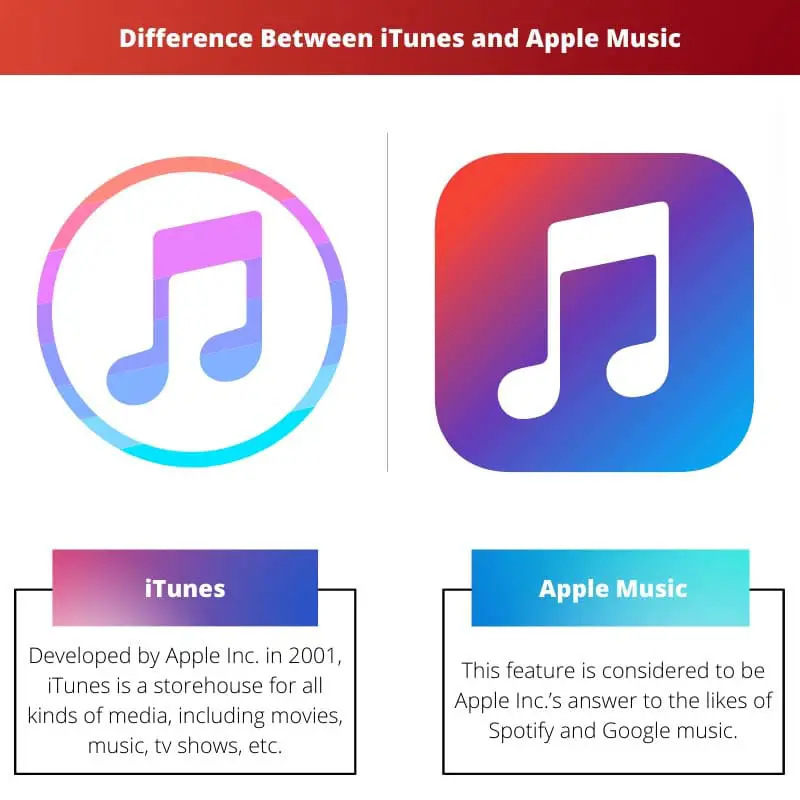Entertainment has been a formative pillar of our cultures and civilizations for centuries. The forms and genres might have changed, but their role remains the same.
This experience underwent a revolution in the early 1990s when music streaming platforms were introduced, though it took years for them to reach every household.
Following the emergence of cell phones, many industries in the communication sectors invested in them. Apple was one of them.
Among the hundred different features of an Apple device, iTunes and Apple Music are two of the most famous. Morphologically, both seem to be involved in the music industry, but they cover extremely different aspects of the same.
Key Takeaways
- iTunes is a media player software developed by Apple that allows users to play, download, and organize digital multimedia content. At the same time, Apple Music is a streaming service that allows users to access a vast library of songs on demand.
- iTunes is a desktop application that needs to be installed on a computer or mobile device, while Apple Music is a cloud-based service that can be accessed from multiple devices.
- iTunes allows users to purchase and own digital media content, while Apple Music provides unlimited access to a large music library for a monthly subscription fee.
iTunes vs Apple Music
iTunes is a free service developed by Apple Inc., a media player, media library, and mobile device management application. Apple Music is a music, audio, and video streaming service developed by Apple Inc., and it works on the subscription model.

Comparison Table
| Parameters of Comparison | iTunes | Apple Music |
|---|---|---|
| Developed in | iTunes was created in 2001 | Apple music was launched in 2015. |
| Use | Manages the media content in the device. | It is solely responsible for the music aspect of the device. |
| Subscription | iTunes is free to use unless you download anything. | After the free trial, one has to become a paid subscriber to continue with Apple Music. |
| Streaming | One cannot stream music on iTunes. It works more as a store, from where you buy content. | Apple Music is primarily a music streaming platform. |
| Devices allowed | With a single Apple id, you can have iTunes on 10 different devices. | With a single Apple id, you can have Apple Music on 6 different devices. |
What is iTunes?
Developed by Apple Inc. in 2001, iTunes is a storehouse for all kinds of media, including movies, music, tv shows, etc. You can purchase/download it for further experience.
It is the equivalent of Double Twist or Play Store on Android devices. It is the go-to destination for Apple users to get access to different kinds of media.
When purchasing a media item from iTunes, space adjustment is critical. For instance, if you are downloading movies on a 16 GB device, you cannot download more than 3.
The device must suit the application’s needs, which may not go smoothly with every user.
iTunes is a program that manages media content on your devices. Though developed by Apple Inc., iTunes is not an Apple-exclusive application.
Even Android or Windows users can access the application.
There are certain features which make iTunes a better-suited application than the rest, such as;
- iTunes and iOS – Although many Apple Inc. applications are available for iOS users, iTunes is the one that manages applications and handles Operating systems aptly.
- Home to unlimited content – iTunes is very helpful, not only for personalized use but also professionally. Numerous podcasts, audiobooks, and media with informational content are available for almost everyone.
Certain features of iTunes or the lack of them might be a worry for the users, such as;
- Speed and Performance – iTunes is not one of your fast-paced applications, especially if used on non-Apple devices. iTunes performance in Android, iOS, and Windows devices is sometimes excruciatingly low. Added to this, it might also affect the speed of the other applications.
- iTunes and Business purposes – iTunes is primarily supposed to manage content on our device. When used for business purposes, it would shelter a lot of unwanted data or material, thus affecting the overall performance.

What is Apple Music?
“All the way you love music, all in one place,” says Apple CEO Tim Cook about Apple music. This feature is Apple Inc.’s answer to the likes of Spotify and Google Music.
Although new, Apple Music, a streaming platform, has overtaken its competitors.
With over 50 million songs from various genres added to those three 24-hour radio stations, Apple Music has attracted the eyeballs of people from over 167 countries.
Unlike iTunes, Apple Music is not an application that manages the device’s content but is solely responsible for catering to the ‘musical needs’ of the users.
Although most of the features in the music streaming platforms remain the same, Apple Music offers video and songs, which is not the case with many others.
With customized and specially curated playlists and impressive integration with the ‘Siri’ feature of Apple devices, Apple Music enhances the music streaming experiences multi-fold.
There are certain advantages of using Apple Music, namely;
- Availability – Apple Music offers a ‘free 3-month trial’ initially. It offers both individual and family plans, with a considerable price difference.
- Diverse music experience – with over 50 million songs, Apple Music has one of the most diverse music collections among the streaming options.
- ‘Connect’ – With a special feature called ‘Connect’, Apple Music lets users sneak peek into their favourite celebrity’s life and preparation.
Considering all the factors, Apple Music surely isn’t the perfect streaming option for the following reasons :
- No free tiers – You cannot use Apple Music for free. Once the free trial is done, one has to become a paid subscriber.
- Once the user ends the subscription, they will not continue to have free access to the downloaded songs.

Main Differences Between iTunes and Apple Music
- iTunes is used to purchase items and is the equivalent of Google’s play store. Apple Music is a music streaming platform.
- iTunes is mainly concerned with the content management of the device. Apple Music, as the name suggests, has more to do with the music aspect of it.
- iTunes can be termed a multimedia app. Apple Music does not curate or offer all types of media.
- iTunes doesn’t require a subscription unless you purchase items from the application. Apple Music is based on a no-free tier formula and is a subscription-based streaming platform.
- Content downloaded from iTunes remains on your device. Music/podcasts downloaded from Apple Music will be available offline if you continue the subscription.

- https://www.tandfonline.com/doi/abs/10.1080/03007766.2016.1264101
- https://www.scss.tcd.ie/publications/theses/diss/2016/TCD-SCSS-DISSERTATION-2016-027.pdf

I’ve always been curious about the differences between iTunes and Apple Music, and this article has provided a thorough explanation. It’s amazing to see how both platforms have contributed to the evolution of digital media consumption.
As a user of both iTunes and Apple Music, I can attest to the accuracy of the information presented here. It’s essential for consumers to understand the distinctions between these services for a seamless entertainment experience.
The evolution of music streaming and digital media management is a testament to the rapid advancements in technology. This detailed comparison of iTunes and Apple Music sheds light on the changing landscape of entertainment consumption.
It’s fascinating to see how streaming services like Apple Music have revolutionized the music industry. The rise of cloud-based platforms has significantly influenced how consumers access and enjoy entertainment content.
The discussion about iTunes and Apple Music has provided valuable insights into the shifting paradigms of media consumption. It’s an exciting time for technology and entertainment convergence.
The detailed breakdown of iTunes and Apple Music highlights the versatility of digital media management and streaming services. It’s remarkable to see how these platforms have adapted to changing consumer preferences over the years.
The impact of Apple Music on the global music scene is astounding. It’s interesting to see how a relatively new streaming service has gained significant traction and user engagement.
The evolution of music streaming and media management through iTunes and Apple Music is really fascinating. It’s incredible to see how technology has changed the way we access and interact with entertainment content.
The detailed comparison table provided here is very informative. It clearly lays out the distinctions between iTunes and Apple Music, making it easier to understand their respective functionalities.
The in-depth comparison of iTunes and Apple Music serves as a comprehensive guide for consumers navigating the digital media landscape. Understanding the nuances of each platform is crucial for making informed decisions.
The article’s exploration of iTunes and Apple Music showcases the multifaceted nature of digital media consumption. It’s remarkable how these platforms have shaped the way we interact with entertainment content.
The analysis of iTunes and Apple Music demonstrates the dynamic evolution of music and media management in the digital age. It’s truly fascinating to witness the transformative impact of technology on entertainment consumption.
This article provides a thought-provoking analysis of iTunes and Apple Music, shedding light on the complexities of digital media consumption. It’s an illuminating guide for users navigating these platforms.
As a user of both iTunes and Apple Music, I resonate with the nuanced comparison presented in this article. It’s crucial for consumers to be aware of the distinctive features and functionalities of these platforms.
The profound insights into the functionalities of iTunes and Apple Music offer a valuable perspective on the evolution of digital media management and streaming. The article effectively captures the essence of these transformative platforms.
This article presents an engaging analysis of iTunes and Apple Music, providing an insightful overview of the changing landscape of digital entertainment. It’s essential reading for those interested in media consumption.
The comparisons drawn between iTunes and Apple Music highlight the diverse features of these platforms. It’s essential for consumers to understand how each service caters to their distinct media consumption needs.
The information provided about the functionalities and usability of iTunes and Apple Music is truly enlightening. Understanding the strengths and limitations of each platform is crucial for optimizing the digital media experience.
I appreciate the insightful analysis of iTunes and Apple Music. It’s essential for consumers to be well-informed about the features and differences between these platforms before making their media consumption decisions.
It’s evident that the introduction of music streaming and media management applications has transformed the entertainment landscape. The analysis of iTunes and Apple Music provides valuable insights into the evolution of these platforms.
The comparison of iTunes and Apple Music’s subscription models is particularly enlightening. Understanding the different access options is crucial for consumers who want to make informed decisions about their media consumption.
Thanks for the comprehensive analysis of iTunes and Apple Music. It’s really helpful to understand the differences between the two and how they function differently.
I’m an Android user, and the information about iTunes being available for non-Apple devices is great to know. It’s good to have access to such a versatile media management application.
Apple Music is truly a game changer in the music streaming industry. It’s interesting to see how it has overtaken its competitors despite being a new service.